Hair Loss After Treatment
Dipika Kakar recently shared her health concerns, specifically the significant hair fall she is experiencing after her liver cancer treatment. She frankly
discussed how she's dealing with this and the challenges of this side effect. Many people, just like her, face this issue after cancer therapies, which can bring with it many emotional and physical challenges. The distress caused by hair loss can be considerable, impacting a person’s self-image and sense of well-being, further adding to the complexities of recovering from a serious illness. This occurrence highlights the far-reaching effects of cancer treatment beyond just the physical management of the disease itself, affecting the mental and emotional aspects of an individual's life. This conversation around health offers important insights and support for others experiencing similar problems.
Causes of Hair Fall
The hair fall that Kakar is experiencing is likely connected to her cancer treatment. Chemotherapy and radiation, commonly used to fight cancer, can disrupt the hair growth cycle. These treatments often target rapidly dividing cells, and unfortunately, hair follicles also fall into this category. During chemotherapy sessions, the hair follicles can be damaged, resulting in hair loss, also known as alopecia. While radiation therapy typically affects only the areas being treated, it too can have an effect on hair follicles, leading to hair loss. The severity of hair loss varies from person to person, and the type of treatment received, dosages, and individual body responses all play a role. It is important to be aware that hair loss is common, but also temporary, and hair growth normally resumes after treatment finishes.
Emotional Impact
Experiencing hair fall after cancer treatment, as shared by Dipika Kakar, can trigger a range of emotions, often leading to psychological distress. For many, their hair is closely tied to their sense of self and how they present themselves to the world. Losing hair can trigger feelings of sadness, anxiety, and even anger, which is entirely normal. These reactions can affect self-esteem and body image, leading to feelings of loss of control. This emotional load may seem very overwhelming, as it adds to the many stresses associated with a cancer diagnosis and treatment. The awareness of the emotional effects of hair loss, and the openness to discuss these feelings, can be essential in finding ways to cope. Support groups, counseling, and practical coping mechanisms can provide ways for individuals to regain their sense of self and face their journey.
Regrowth and Recovery
Fortunately, for many cancer patients, hair regrowth is possible after treatment concludes. The timeline for hair to grow back can vary significantly among individuals. Hair regrowth usually starts a few weeks or months after treatment has ended. The initial growth may appear different in texture and colour compared to the hair before treatment. It can be curlier, straighter, thicker, or thinner, and changes in colour are also quite common. It is essential to understand that the new hair grows as a result of the body's recovery process and reflects the changes that the body goes through during treatment. Caring for the newly growing hair requires patience and care, and using gentle hair products and avoiding harsh treatments can help support its health. In the journey of regaining hair, knowing that hair regrowth is possible and taking steps to care for the scalp can bring comfort and hope.













